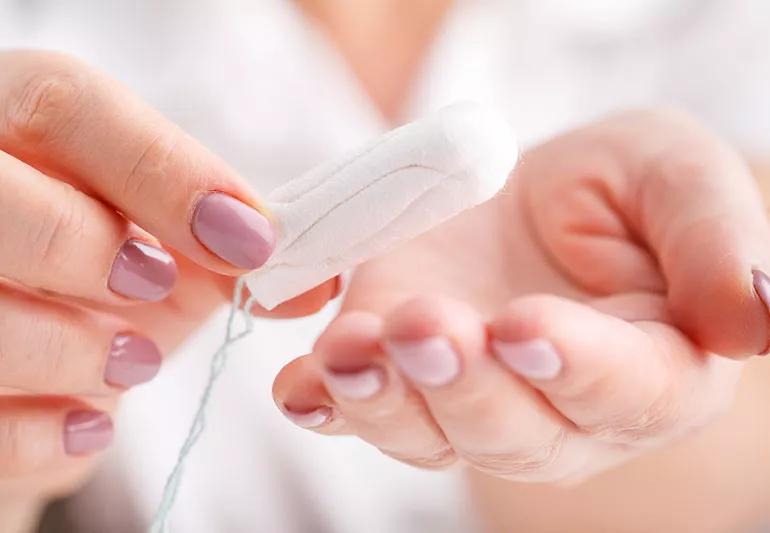With straightforward explanations, this doesn’t need to be an uncomfortable conversation

Parenthood is full of moments that push you outside of your comfort zone — and that doesn’t stop when your kids hit double digits. Except now, instead of changing diapers and handling tantrums, you’re fielding questions like, “How do I use a tampon?”
Advertisement
Cleveland Clinic is a non-profit academic medical center. Advertising on our site helps support our mission. We do not endorse non-Cleveland Clinic products or services. Policy
You might feel as awkward answering this question as your child feels asking it. But take a deep breath: This is actually an opportunity to bond, build trust and share guidance that will help them feel more at ease with the changes happening to their body.
There’s no set age when a person can or should start using tampons, so there’s no hard and fast rule about the “right” time to teach your tween or teen how to use them.
“Tampons can be used from the first period on, or they may never be used,” says Ellen Rome, MD, Head of Adolescent Medicine at Cleveland Clinic Children’s.
The decision to use them (or not) largely depends on your household dynamics, as well as your child’s interest in using tampons over, say, pads or a menstrual cup. A teen who’s on the swim team, for example, may take more initiative than a teen who grows up in a household where no one uses tampons.
So don’t rush it or force it. But if your child tells you they’re ready to give it a try, you can help coach them through it with these tips.
If you’ve never done it before, the idea of putting a tampon inside your body can be a scary one. Talking your teen through the process can help ease their anxiety and make sure they get it right.
Advertisement
Before you have the how-to talk, make sure you’ve got all the necessities on hand — starting with the tampons themselves.
“Slender tampons are probably easiest for a first-timer to use,” Dr. Rome says. But because slim tampons are also the lowest absorbency, be sure to discuss how often your teen may need to change out their tampon for a new one, especially on heavy-flow days.
Some teens might find it helpful to use a hand-held mirror to see what they’re doing down there. And Dr. Rome also suggests purchasing a water-based, water-soluble lubricant, like K-Y Jelly®, to put on the tip of the tampon. This will help it more easily slide past the muscle at the outside of the vagina.
A pre-teen or teenager who is new to having their period probably isn’t intimately familiar with all of the body parts “down there” — and that’s often the biggest hurdle to learning to use tampons.
“You can use a diagram to help show where the tampon is supposed to fit and to explain that it needs to go in at an angle almost parallel to the thigh,” Dr. Rome says.
As you explain how to properly insert a tampon, you can take one out of the packaging to demonstrate how to hold it between your thumb and middle finger, and how to use your pointer finger to release the tampon from the applicator.
Before your teen tries inserting a tampon for the first time, encourage them to stand or sit in a comfortable and even relaxing position. That could mean sitting on the toilet, standing with a leg up on the bathtub or even lying down.
Provide some reassurance that putting in and taking out a tampon can feel a little funny or uncomfortable at first, and it might take a little while to get the hang of it — but it’ll get easier and more comfortable with practice.
“Very rarely, there can be some anatomical obstacles,” Dr. Rome notes. “If it isn’t easy to put in, or if it hurts, it’s a good idea to touch base with your pediatrician or an adolescent medicine specialist.”
Once you’ve been using tampons for a while, it’s easy to forget that the details aren’t always self-explanatory! “Remember that this is all new to your teen, so it’s important that you cover all the basics,” Dr. Rome reiterates.
That includes facts like:
Advertisement
It’s also helpful to read up on common myths and misconceptions about tampons so that you’re fully prepared to answer any questions your teen might have.
It’s critical that you teach your teen about toxic shock syndrome and how to avoid it — namely, by putting in a new tampon every four to six hours. Leaving a tampon in too long can cause other health issues, too, so it’s extra important that they understand the dangers.
“If they’re particularly forgetful, you can even encourage them to set an alarm or reminder that will tell them when it’s time to swap out their current tampon for a new one,” Dr. Rome suggests.
One more thing: You can wear a tampon overnight if you get up to change it every six hours, but any longer than that risks toxic shock syndrome. So when your teen is getting used to wearing tampons, it’s probably best not to risk it, just in case they oversleep or forget about it in the morning. Pads and period underwear are a better bet.
Feeling stressed about having this conversation with your kid? Remember that you aren’t in this alone.
“If this discussion feels too far outside of your comfort zone, schedule an appointment for your teen to meet with an adolescent medicine specialist,” Dr. Rome says. “Your healthcare providers are here to help.”
Advertisement
Learn more about our editorial process.
Advertisement

Most chest pain in kids isn’t worrisome, but there are some symptoms that deserve attention

It’s important to angle it toward your rectum or back, along the natural curve of your vaginal canal

Yes, you can pee with a tampon in; no, they won’t stretch out your vagina or make cramps worse!

The emergency room is for serious medical issues; urgent care can help when you can’t get a quick appointment with your child’s doctor

Lice don’t jump — but they can spread with direct head contact

Some warts will clear up on their own, but others may need home remedies or medical care

Autism and OCD often co-occur, but distinguishing between them is crucial for successful treatment

An allergist can help you make a plan that includes information about what to do in case of an allergic emergency

Wearing a scarf, adjusting your outdoor activities and following your asthma treatment plan can help limit breathing problems

Your diet in the weeks, days and hours ahead of your race can power you to the finish line

When someone guilt trips you, they’re using emotionally manipulative behavior to try to get you to act a certain way